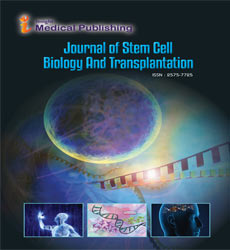ISSN : 2575-7725
Journal of Stem Cell Biology and Transplantation
Mesenchymal Stem Cells Living Drug Molecules
Abstract
The concept of mesenchymal stem cells (MSC) being proposed as a medicinal signaling agent is based on the fact that cells are not single molecular agents. MSCs, which more appropriately may be called ‘Living Drug’ molecules, are adaptive agents capable of complex functions involving many bioactive factors. These multi-potent cells may be considered injury-specific drug stores that home to the site of injury and secrete considerable levels of immunomodulatory and trophic factors. MSCs reduce inflammation, modulate the immune system, as well as stimulate other cells to perform their functions effectively (paracrine properties). In addition, MSCs can function as regulated delivery vehicles and target specific molecules that act against cancerous cells. This could be an interesting avenue of research in cancer immunotherapy, to enhance the outcomes of dendritic and natural killer cell therapies.
Mesenchymal cell-based therapy is emerging as an extremely promising approach for tissue regeneration owing to the availability, ease of harvest and transplant of cells. Capitalizing on the regenerative potential of the human body also ensures reduced side effects along with enhancing the overall health of individuals. Current research also includes development of bioactive scaffolds that are capable of supporting activation and differentiation of host stem cells at the required site. In the future, through these living drug molecules, it will be possible to use human native sites as micro-niche/micro-environment for potentiation of the human body's site-specific response.
Research on cells and growth factors in the human body will expand the horizon of translational medicine and provide definitive therapeutic solutions to several acute, chronic, and lifestyle-mediated diseases. The ultimate aim is to REGENERATE and not REPAIR and change the scenario of medical therapy from the use of PILLS to CELLS.
Open Access Journals
- Aquaculture & Veterinary Science
- Chemistry & Chemical Sciences
- Clinical Sciences
- Engineering
- General Science
- Genetics & Molecular Biology
- Health Care & Nursing
- Immunology & Microbiology
- Materials Science
- Mathematics & Physics
- Medical Sciences
- Neurology & Psychiatry
- Oncology & Cancer Science
- Pharmaceutical Sciences
